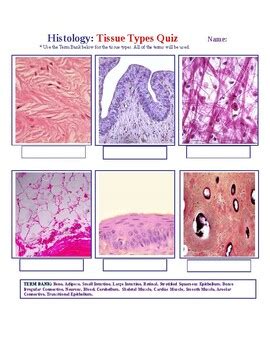Test your knowledge of the different tissue types in the human body with this comprehensive quiz.

Question 1: Which tissue type is characterized by specialized cells that contract to enable movement?
(A) Connective tissue
(B) Muscle tissue
(C) Nervous tissue
(D) Epithelial tissue
Question 2: What type of tissue lines the surfaces of organs and cavities within the body?
(A) Connective tissue
(B) Muscle tissue
(C) Nervous tissue
(D) Epithelial tissue
Question 3: Which tissue type provides support, strength, and protection to the body?
(A) Connective tissue
(B) Muscle tissue
(C) Nervous tissue
(D) Epithelial tissue
Question 4: What type of tissue transmits electrical impulses throughout the body?
(A) Connective tissue
(B) Muscle tissue
(C) Nervous tissue
(D) Epithelial tissue
Question 5: Which type of connective tissue is characterized by a soft, jelly-like matrix?
(A) Bone
(B) Cartilage
(C) Tendon
(D) Blood
Question 6: What type of connective tissue forms the protective covering of bones and other organs?
(A) Periosteum
(B) Endosteum
(C) Fascia
(D) Synovial membrane
Question 7: Which type of muscle tissue is found in the walls of blood vessels?
(A) Skeletal muscle
(B) Cardiac muscle
(C) Smooth muscle
(D) Intermediate muscle
Question 8: What type of nerve tissue transmits impulses from the brain to the spinal cord?
(A) Sensory neurons
(B) Motor neurons
(C) Interneurons
(D) Receptor cells
Question 9: Which type of epithelial tissue is found in the lining of the gastrointestinal tract?
(A) Simple squamous epithelium
(B) Simple cuboidal epithelium
(C) Simple columnar epithelium
(D) Stratified squamous epithelium
Question 10: What type of epithelial tissue forms the lining of the respiratory tract?
(A) Pseudostratified columnar ciliated epithelium
(B) Stratified transitional epithelium
(C) Simple cuboidal epithelium
(D) Stratified squamous epithelium
Understanding tissue types is essential for comprehending the structure and function of the human body. Here are some key concepts to keep in mind:
Connective Tissue: The most abundant tissue type in the body, connective tissue provides support, strength, and protection. It consists of a variety of cell types embedded in a matrix of fibers and ground substance.
Muscle Tissue: Muscle tissue enables movement. It is composed of specialized cells called myocytes that contain contractile proteins.
Nervous Tissue: Nervous tissue transmits electrical impulses throughout the body. It consists of neurons, which are specialized cells that generate and propagate electrical signals.
Epithelial Tissue: Epithelial tissue lines the surfaces of organs and cavities within the body. It provides protection, secretion, and absorption.
Knowledge of tissue types has numerous applications, including:
- Diagnostics: Diagnosis of diseases based on the examination of tissue samples (e.g., biopsies).
- Treatment: Development of targeted therapies and surgical procedures based on tissue characteristics.
- Research: Understanding the structure and function of tissues to develop new treatments and interventions.
Mastering tissue types is crucial for a comprehensive understanding of human anatomy and physiology. By taking this quiz, you can assess your knowledge and gain a deeper understanding of the fundamental building blocks of the human body.
